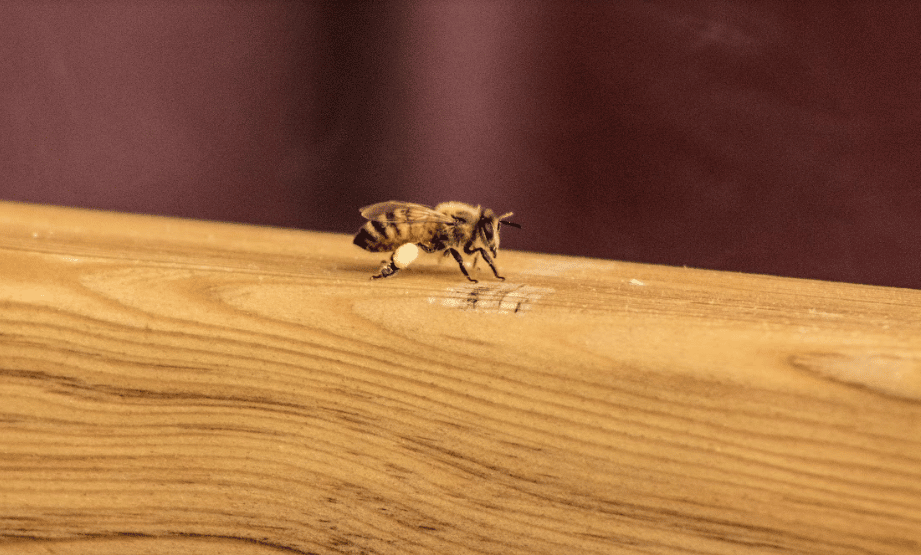I: What’s your name, surname and role?
N: My name is Noa Simon Delso, i’m spanish, and i’m a veterinarian , ecotoxicologist (a person that studies the pollutants in the environment and how they impact wild animals) and i’m the scientific director and project manager of Beelife (european beekeeping coordination) that is working to protect the pollinators and beekeepers.
I: Could you tell us tweet style, what your research field is?
N: What we do is observe the field and everything that happens there and then study the way in which reality fits theory. We actually check how the european regulatory framework and laws are implemented. Everytime we observe a problem in the field that should not happen we evaluate what the law says and we communicate to the competent authorities our findings and how they could fix them.
I: When did you start to develop this passion for this research area?
N: It was quite a long time ago! I’ve been working for Beelife since 2009 and I think even before I came across these topics I was interested in them. Specifically the topic of pollinators protection however, I would say since 2009.
I: When you were a kid, what did you dream of becoming once grown up?
N: Not at all! When I was little I didn’t know exactly what I wanted to do. For a while I knew I wanted to be a judge, I wanted to be a teacher, I wanted to be an investigator. In a sense what I do now combines all three. In some aspects I still work with laws and regulations. From the perspective of an investigator my job still has the curiosity and the want to look at what’s around you. And if we look at it from the point of view of a teacher it’s actually related to explaining how things work or how things are to people so that they actually understand what the problems are and what needs to be done. It’s true that i never thought about being pollinator veterinarian but it’s true that today I apply a lot of the things I dreamt of becoming as a child.
I: Tell us the two research areas that are the most interesting according to you?
N: One field that fascinates me is field observation, how biology works. And also a thing I feel attracted to is everything related to toxicology. Quite the opposite from the first one since the first one studies life and the other death. It’s really interesting to see how our body reacts to contaminants or how contaminants distribute in different environments. You can never say that “This isn’t going to happen”. When you observe what happens in reality you always get surprised.
I: According to you, what’s the main threat against bees and pollinators in general nowadays?
N: The short term economic interest. Not thinking in the long run we are also destroying everything. We don’t think about the long impact of human actions. When we translate this into the general political decisions it shows. This is actually hampering good development for pollinators, in biodiversity. If we agree to protect nature we do it because it has an economic value because we as human beings profit from it , it’s the capitalist way of seeing life.
I: If you had a budget of 1M€, how would you use it to protect pollinators?
N: Unfortunately with one million euros even if it seems a lot it isn’t. All my effort would be to inform and convince everybody that we all need to engage with nature and pollinators. it is in our interest. I would put hundreds of millions into this cause. I believe we need to invest into people. Only with that will we be able to change that in the future.
I: According to you, which scientific discoveries within your field could realistically be made in 5-10 years which could make a difference in protecting pollinators?
N: All the research that is done nowadays is made on monitoring. Inventories of species and how they go, if the tests made on them are positive or negative. its fundamental research. However nowadays instead of making plenty of gadgets i would like science to be put into capacity building and have more people do world observation. mainly working on training or raising awareness. There is a bit of a problem with technology and there’s the belief that it’s going to save us all. I just use it to make us better prepared to face what problems we might have. As of now the opposite is happening, it’s making us more stupid by only reling on it and not using it as an instrument to help us reach our goals we are limiting ourselves. I also think that research should also go towards making us more intelligent and towards giving us information that we couldn’t have. If we can get people to have easy access to what’s happening in their surroundings it would help them realize what’s happening in our environment.
I: What’s your favorite insect?
N: I dont have one! I like flying bugs a lot. I’m very crazy about fruit flies. They are interesting creatures. Bees of course but also beetles and earthworms. Nature managing to adapt in all these different forms is truly amazing!
